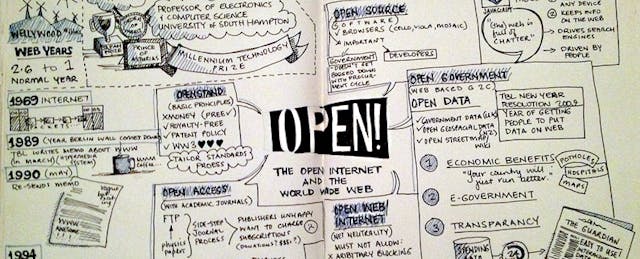Every late January, educators descend on Science Leadership Academy in Philadelphia to propose and participate in conversations about shared passions at EduCon. This year, 570 like-minded educators braved the polar vortex to imagine ways that learning could be different.
Many of the conversation strands were familiar: moving a school towards 1:1, integrating the arts, project-based learning, design thinking, curating digital content, managing change and a call for different school models that focus on student-centered learning. An almost wistful desire to return the wonder of learning to our students pervaded the weekend.
Who Benefits? Who Profits?
Friday night’s “Openness: Should We Create a More Transparent World" panel was a lively, nuanced, and cautiously optimistic discussion around how much “openness” we have and should want in our world. Immediately apparent was the need to recognize varied definitions of openness and transparency and to realize the range of responsibilities and possibilities.
Panelist Kin Lane, an API evangelist who actively advocates for Internet openness and has opened government data for the Dept. of Education and other government agencies, shared that he wrestles with the gravity of transparency and the responsibility that comes with it. Using Facebook as an example, he raised the question of “transparency being the #1 moneymaker right now” for many companies, which led to a thoughtful debate on who benefits from transparency and openness. When do we want openness and when should we be more cautious?
David Wiley, an advocate for open courseware, argued that the last 18 months’ focus on MOOCs has “sucked the air out of conversation around innovation in education.” Wiley conceded that MOOCs are interesting experiments, but they have crowded out other, equally important experimentation. Venture funding for MOOCs has driven public attention and distracted people from the business of educating students to the business of selling to them. Wiley further argues that this misalignment in incentives will continue to drive true innovation to the margins.
Wiley also questioned how innovative MOOCs really are; he pointed out that in the 1960s, we thought that television “...will really open up education,” the same claim made about MOOCs now. Tone down all the claims around “innovation,” urged Wiley, and engage in more substantive conversation about the challenges of MOOCs and other new learning models. Otherwise, “we’re in danger of making bad education faster and more efficient,” Wiley warned.
Homa Tavangar, author of Growing Up Global, acknowledged many of Wiley’s points but also underscored the good MOOCs can contribute, especially for underprivileged students everywhere. A significant underground group in Iran, for example, is using open courseware to educate a generation of students denied access to education because of their religion. Jaime Casap, Google’s education evangelist, also suggested that MOOCs can be a refuge for American students who, for a variety of factors, find it difficult to leave their own communities to receive a quality education.
Panelist Sunny Lee, product lead at Mozilla Open Badges, acknowledges just what “open” means has become murky and is in danger of losing its original meaning. Open badges allow anyone to demonstrate competencies they may have earned outside of traditional certificate and diploma programs, thus opening the accreditation system.
Casap summarized the conversation by suggesting that we should teach students not only about digital citizenship but how to take “control over their digital portfolio.” The world is becoming more open with all of its challenges and promises, he said, and we need to help students navigate this world and prepare them to design this world in the future. He also added that we need to recognize student vulnerability in an age of cyber bullying.
Open Data, Open Minds, Open Hearts
Attendees were particularly moved by a lightning talk by Kristi Blakely, founder of Project H.E.L.L.O. (Helping Everyone Locate Loved Ones): High school students have used open data to help over 450 homeless people send messages or even connect with family and friends. A need for empathy and an openness to others resonated throughout many sessions, as educators challenged schools to remember the importance of social and emotional learning.
Perhaps Science Leadership Academy founder Chris Lehmann said it best in a thought-provoking session run by Jose Vilson and Audrey Watters, entitled “Privileged Voices.” Said Lehmann: “We need to acknowledge that we have a responsibility to each other….Do you allow room to make someone else’s view important to you?”
Google Glass? Not Yet
So, what was new this year?
More sessions on augmented reality and wearable tech popped up than in the past years. While these tools are currently far too expensive to be used in all but a handful of classrooms ($1,500 for Google Glass!), educators are beginning to imagine how these kinds of tools might impact education in the future.
Should Every School Throw a Bake Sale (or a Conference!)?
Lehmann shared that in the past, the proceeds of Educon have gone to purchasing technology and supporting other school initiatives at the Science Leadership Academy (SLA). By contrast, this year the funds will likely go towards saving teacher positions at SLA as the Philadelphia school system struggles with budget constraints and lays off teachers.


